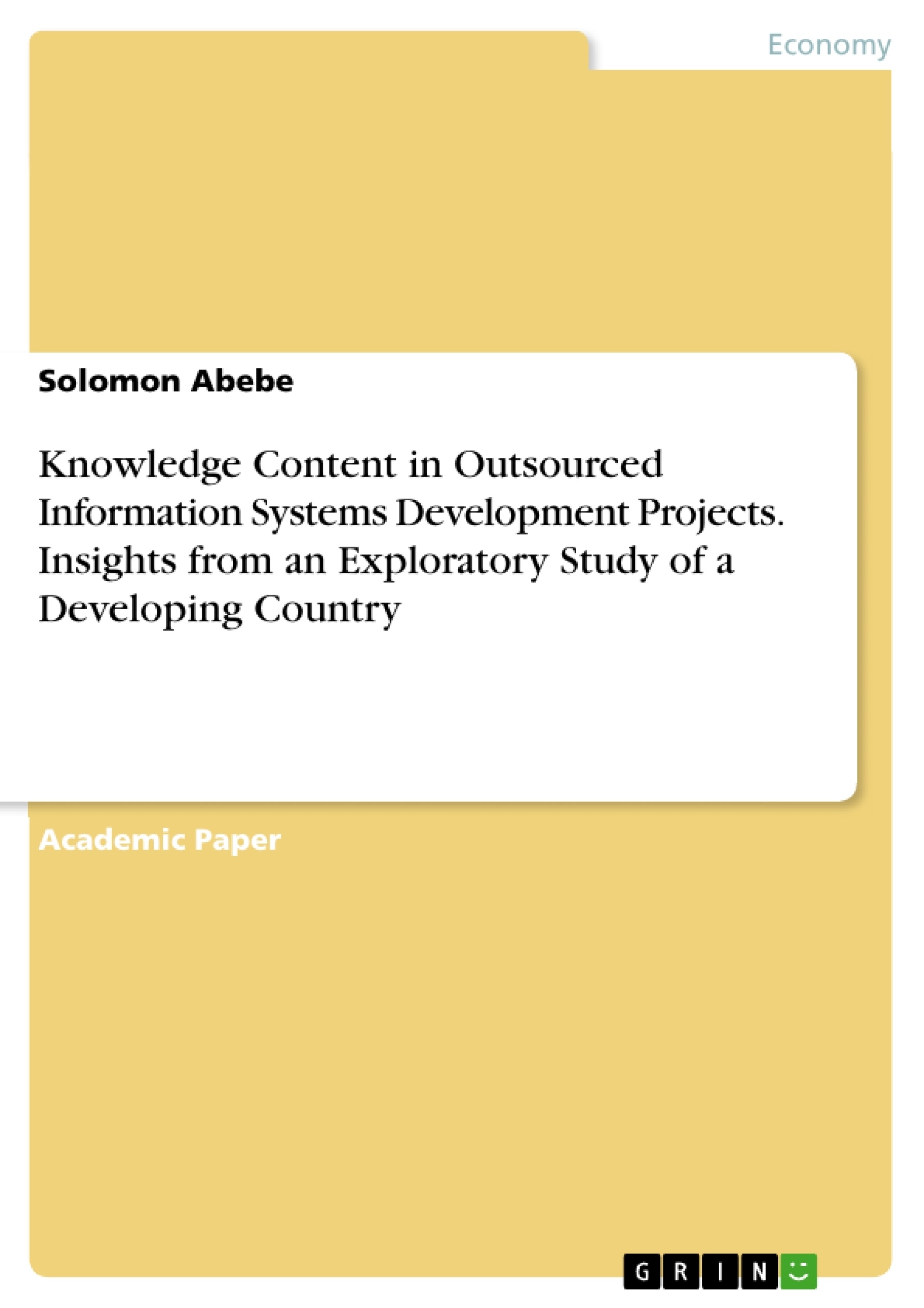This paper presents an exploratory study of knowledge content in outsourced Information systems development projects within the context of a developing economy, in general, and Ethiopia, in particular. Semi-structured interviews were conducted with ten project managers to identify the relevant knowledge types in information systems outsourcing.
The results indicate that six knowledge types, namely business domain knowledge, technical knowledge, information systems application knowledge, organizational knowledge, adapted information systems development methodology knowledge, and newly generated project-specific knowledge are important in information systems development outsourcing. The analysis suggests that the identified knowledge areas are not completely independent, but rather they are complementary. Both knowledge types are necessary for the development of information systems. Moreover, neither the client nor the vendor possesses the full range of the required knowledge.
The paper then argues that the very generic classification of knowledge has limitation to provide a complete specification of the knowledge items needed in information systems outsourcing context. It also notes that the knowledge content in outsourcing arrangements of Ethiopia is characterized by inadequate and unrelated knowledge transfer between outsourcing partners; less attention paid by vendors to knowledge about the clients' existing systems and IT landscape; and low level of awareness about the knowledge content with regard to know-why of using a new system or technology.
Inhaltsverzeichnis (Table of Contents)
- Abstract
- Introduction
- Literature Review
- Knowledge
- Dimensions of knowledge in ISO
- Research Methodology
- Data Analysis and Results
- Discussions
- Conclusion
Zielsetzung und Themenschwerpunkte (Objectives and Key Themes)
This research aims to comprehensively identify and characterize the specific types of knowledge that are crucial for successful information systems outsourcing (ISO) projects, particularly in the context of developing economies, specifically Ethiopia. By exploring the knowledge content within ISO deals, this study seeks to provide a detailed understanding of the knowledge transfer process and its impact on project outcomes.
- Identification and categorization of knowledge types relevant to ISO projects.
- Analysis of knowledge transfer dynamics between outsourcing partners (client and vendor).
- Investigation of challenges and opportunities related to knowledge transfer in the Ethiopian context.
- Exploration of the role of context-specific knowledge in addressing the success of ISO initiatives.
Zusammenfassung der Kapitel (Chapter Summaries)
- Introduction: This chapter introduces the central role of knowledge in ISO deals, highlighting the knowledge-intensive nature of information systems development and the importance of successful knowledge transfer between outsourcing partners. The chapter also emphasizes the challenges faced by ISO projects in developing countries, particularly in Ethiopia, and identifies the need for a deeper understanding of the knowledge content required for success.
- Literature Review: This chapter examines existing literature on knowledge and its various taxonomies, including the widely used explicit/tacit and individual/collective dichotomies. The chapter further explores the dimensions of knowledge relevant to ISO, specifically focusing on the importance of technical and business knowledge in outsourcing arrangements.
Schlüsselwörter (Keywords)
This paper focuses on key concepts such as knowledge content, knowledge transfer, outsourcing, information systems, and their application within the Ethiopian context.
Frequently Asked Questions
What types of knowledge are crucial for Information Systems Outsourcing (ISO)?
The study identifies six key types: business domain, technical, IS application, organizational, methodology-specific, and newly generated project knowledge.
What are the challenges of knowledge transfer in Ethiopia?
Challenges include inadequate and unrelated knowledge transfer, a lack of attention to existing IT landscapes by vendors, and low awareness of the "know-why" of new technologies.
Do clients or vendors typically possess all required knowledge?
No, the analysis suggests that neither the client nor the vendor possesses the full range of knowledge, making effective transfer and collaboration essential.
Why is business domain knowledge important in IS development?
It allows developers to understand the specific context and requirements of the client's industry, ensuring the final system actually meets business needs.
What is "newly generated project-specific knowledge"?
It is the knowledge created during the project through the interaction of team members, solving specific problems that arise during development.
- Citar trabajo
- Solomon Abebe (Autor), 2018, Knowledge Content in Outsourced Information Systems Development Projects. Insights from an Exploratory Study of a Developing Country, Múnich, GRIN Verlag, https://www.grin.com/document/503568



